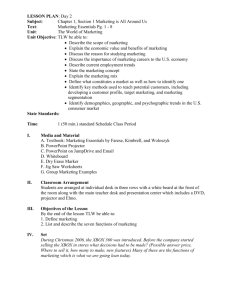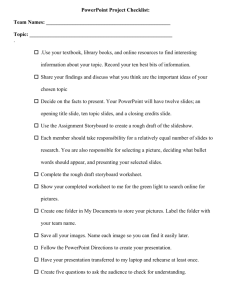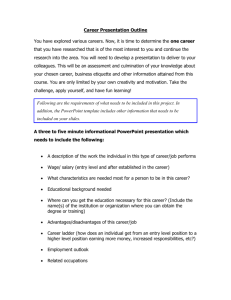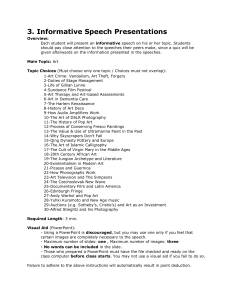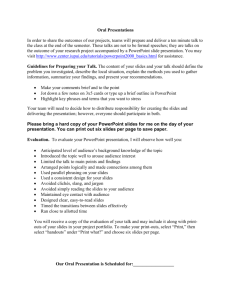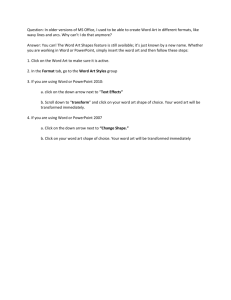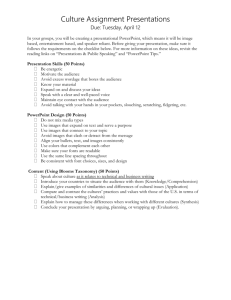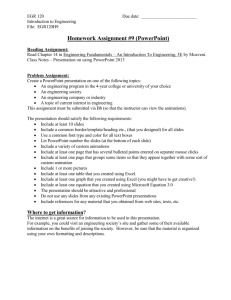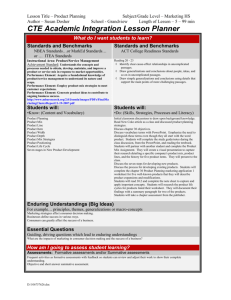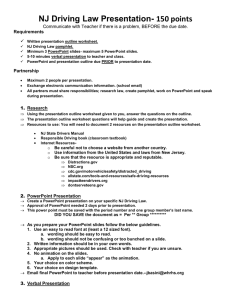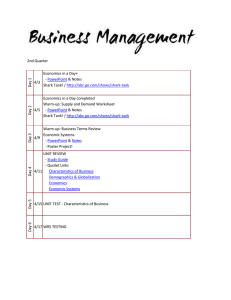LP 1.
advertisement
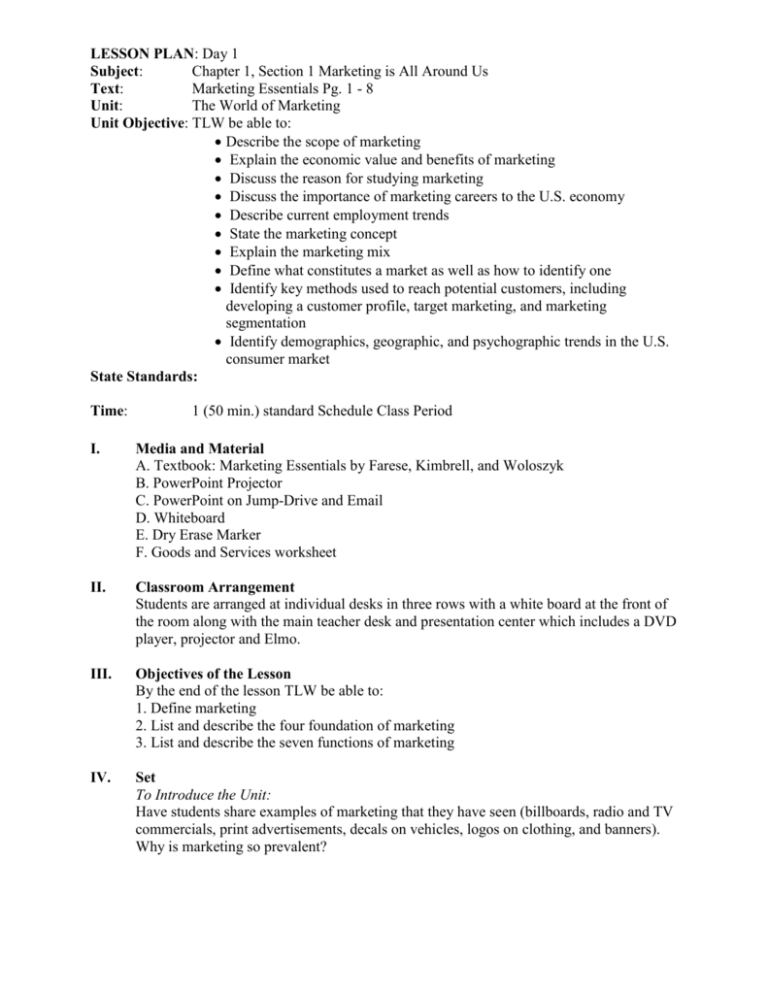
LESSON PLAN: Day 1 Subject: Chapter 1, Section 1 Marketing is All Around Us Text: Marketing Essentials Pg. 1 - 8 Unit: The World of Marketing Unit Objective: TLW be able to: Describe the scope of marketing Explain the economic value and benefits of marketing Discuss the reason for studying marketing Discuss the importance of marketing careers to the U.S. economy Describe current employment trends State the marketing concept Explain the marketing mix Define what constitutes a market as well as how to identify one Identify key methods used to reach potential customers, including developing a customer profile, target marketing, and marketing segmentation Identify demographics, geographic, and psychographic trends in the U.S. consumer market State Standards: Time: 1 (50 min.) standard Schedule Class Period I. Media and Material A. Textbook: Marketing Essentials by Farese, Kimbrell, and Woloszyk B. PowerPoint Projector C. PowerPoint on Jump-Drive and Email D. Whiteboard E. Dry Erase Marker F. Goods and Services worksheet II. Classroom Arrangement Students are arranged at individual desks in three rows with a white board at the front of the room along with the main teacher desk and presentation center which includes a DVD player, projector and Elmo. III. Objectives of the Lesson By the end of the lesson TLW be able to: 1. Define marketing 2. List and describe the four foundation of marketing 3. List and describe the seven functions of marketing IV. Set To Introduce the Unit: Have students share examples of marketing that they have seen (billboards, radio and TV commercials, print advertisements, decals on vehicles, logos on clothing, and banners). Why is marketing so prevalent? LESSON PLAN: Day 1 Subject: Chapter 1, Section 1 Marketing is All Around Us Page #2 To Introduce the Daily Lesson: Without defining a service and product, use PowerPoint to display several products and services, and have the class choose whether the slide represents a product or service. Call on students to answer. After the class has finished choosing, give them the true definition of a good and service. Then, go back through the slides to see if their answers were correct. Point out the slides that have both a good and service represented such as a drive through order where the food is the good and the server would be the service. V. Instruction (Teacher Talk) A. Presentation of Information 1. Teaching Strategies a. Question and Answer b. Group Discussion 2. Technology Support a. PowerPoint Slide #1 – State Objectives b. PowerPoint Slide #2 & 3– What is Marketing? Marketing – the process of developing, promoting, and distributing products in order to satisfy customers’ needs and wants Products – include both goods and services Goods – tangible items (car, shoes, hat, and Ipod) Services – non-tangible items (oil change, hair cut, tax return) Exchange – takes place every time something is bought or sold in the marketplace c. PowerPoint Slide #4 & 5 – Four Foundations of Marketing Business, Management, Entrepreneurship Foundation – Basics of business, management and entrepreneurial concepts affecting business decisions Economic Foundation – Basic economic principles and concepts both free market and enterprise economies Communication and Interpersonal Skills Foundation – Understanding how communications affect the marketing decision. People skills needed. Professional Development Foundation – Understanding how to expand your career through personal exploration, growth, and development. d. PowerPoint Slide #6– The Marketing Concept Businesses should strive to satisfy customers’ needs and wants while still generating a profit. Customer satisfaction is a major part of marketing success LESSON PLAN: Day 1 Subject: Chapter 1, Section 1 Marketing is All Around Us Page #3 Everyone in marketing process most strive to fulfill the customer needs B. Check for Understanding 1. Question/Answer a. What is a good? b. What is a service? c. Marketing jig-saw exercise worksheet C. Monitoring and Adjusting 1. Ensure students are taking notes and can see the presentation material. 2. Adjust the classroom activities to meet the students’ needs depending on the students’ involvement and comprehension of the material. D. Guided / Supervised Practice 1. The students will work on the goods and services worksheet. VI. Closure Ask the students’ questions. What is an exchange? Why is understanding this simple concept important to understanding marketing? The title of chapter is Marketing is all around us. Is that a true statement? Explain. VII. Assessment: Mastery of Objectives 1. Question/Answer 2. Guided / Supervised Practice 3. Group Practice 4. Independent Practice 5. Review VIII. Reflection: How would I change the lesson if I taught it again?
